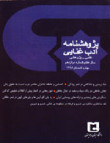The demand for livelihoods in the poetry of praise poets is based on the ratio of the individual to Anvari
In persian literature many poets eulogized kings, commanders, agents and accountants and they expected to recieve reward for their livelihood. Due to this, there is a section in persian literature entitled demands. Among poets of persian literature there were poets who did not belittle themselves for meeting their daily needs in this way, but if we compare the life conditions of these poets and their life situations with each other we will percieve that most of times they were inevitable to behave in such a way and also comparing people from moral point of view is correct when they have the same conditions. So, it is not correct to attribute beggary to these poets and it is not a fair judgement..Anvari is among those poets that researchers consider him as an excellent poet. However, from moral point of view some of contemporary literati with dismissing historical, social and cultural situations and Anvari's personal life conditions have called him a beggar.In this research demand poems of poets such as Rudaki, Onsori, Farokhi, Manoochehri, Masood Sad, Ghataran Tabrizi, Moazi, Sanaie, Amaghe Bokhari, Adib Saber, Osman Mokhtari, Abdolvase Jabali, Ghavami Razi, Osman Mokhtari, Soozani Samarghandi, Asir Akhsitki, Jamal Al din Abdorrazagh Esfehani, Khaghani, Bilghani, Rashid Vatvat, Zahir Faryabi and Kamal Al din Esfehani are investigated to understand that whether the accusation of beggary attributed to Anvari by many researchers of persian litrature is right or wrong and also we investigate the development of material demands of poets and the causes of such demand poems.
Firstly, related versus and causes of composing demand poems were extracted and then through analytical- discriptive method the reseach questions were answered.
Maazi as the poet laureate of Saljugh era demanded horse tent, horse, camel, silver cup, incense, amber, musk, last year prize, Turkish beautiful woman and sumptuous cloth. In his poems he explicitly demanded rewards and prizes. The development of demands from Samanid to Saljugh era can be observed through comparing demands of Rudaki, Onsori and Mazi as three distinguished poet laureates. Not only in the poems of Mazi( as the poet of Saljugh era) but also in the poems of other poets from this era trifle goods are demanded, for example Sanaie demanded rice, bread,fruits, prize, money( Derham), silver. Osman Mokhtari also demanded bread, cloth, wine, gold, prize, loan and silver. Abdolvase Jebeli also demanded wine, cloth, house, and loan. Another poet Ghavami Razi demanded bread, meat, mistress, horse, prize, price of turbun, saddle and cloth. The last poet is Asir Akhsitki who demanded straw and barely for his horse, meat, camel, wine, horse, paper, money ( Dinar), silk cloth and robe.
Anvari can not be vindicated from beggary accusation, but as it can be seen in most poets' Divans that we investigated including Rudaki, Manoochehri, Farokhi, Onsori, Masoud Sad Salman, Sanaie, Zahir Faryabi, Rashid Al din Vatvat, Jamal Al din Esfehani, Osman Mokhtari, Soozani Samarghandi, Kamal Al din Ismaeil Esfehani, Mojir Al din Bilaghani, Abdolvase Jebali, Ghataran Tabrizi, Moazi,Khaghani, Asir Akhsitki and Ghavam Tabrizi, there are explicit and implicit demands. Almost all the trifle demands that Anvari due to those was accused exist in poems of pre- Anvari poets and especially in poems of those who lived in Anvari's period. Persian language demands transformed gradually. In Samanid era in which eulogies were normal and far from exaggeration the poets demanded more generosity and the goods did not include trifle things and they were expressed indirectly. In Ghaznavi era praising odes were more exaggerated and demands were expressed more direct and explicit and gradually trifle demands were penetrated poems. In Saljuk era in which praising odes reached its climax and the praised people were portrayed in full exaggeration, it seemed that others did not deserve those odes and they did not understand the value of poets and in result demands of poets were expressed more explicitly in comparison to prior eras and they included other trifle goods, too.Reasons such as lack of job's security and lack of income sources and special importance of poets' praising for people in power led poets to compose demand and praising poems.Instability of political situation of ministers and governmental agents led them to pay more attention to their power position and they did not have necessary time and composure for other poets. In addition, the poets had to praise two rivals simultaneously and this made the praised ones annoyed and they did not give expensive rewards and this caused many poets were satisfied even with trifle demands.Finally, at the end of this research it can be mentioned that it is not correct to consider Anvari a beggar, because it is a historical fact that demand poetry was a common issue among all persian poets and it was ont restricted to Anvari.The difference among Anvari's demand poems and other poets' was due to political, social and cultural condition of that period. Perhaps one of the reasons that caused that some of contemporary researchers consider Anvari as a beggar is that in past some people such as Hatefi Jami and Azar Bigdeli considered him as one of the three pinnacles of persian poetry and positioned him beside great poets such as Ferdowsi and Saadi and dismissed poets such as Mowlavi, Hafez, Sanaie , etc. It should be noted that Anvari like Sanaie at last put the demand poetry aside and he considerd it as begging and he composed poems in praising needlessness which are unique in persian litrature.
Anvari , begging , demands , the praised on
- حق عضویت دریافتی صرف حمایت از نشریات عضو و نگهداری، تکمیل و توسعه مگیران میشود.
- پرداخت حق اشتراک و دانلود مقالات اجازه بازنشر آن در سایر رسانههای چاپی و دیجیتال را به کاربر نمیدهد.


